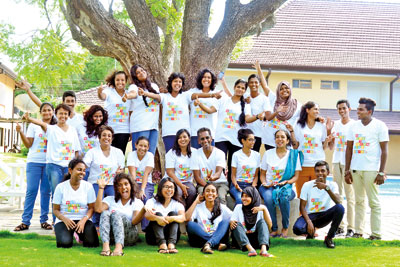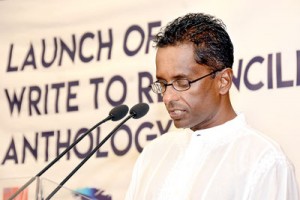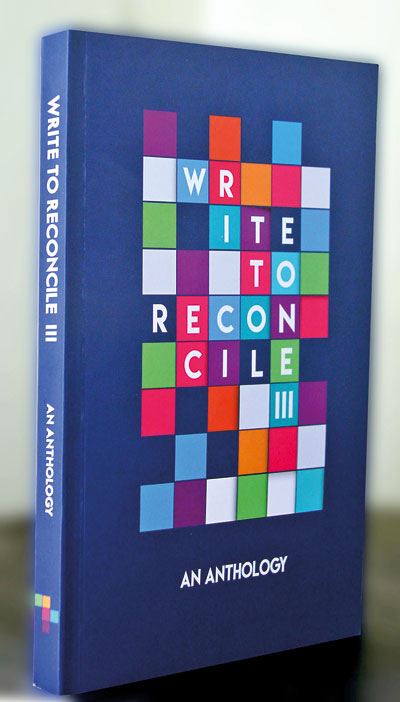Arts
Words that help us remember

The 25: The young writers who were part of the third Write to Reconcile programme with Shyam and Amrita Pieris
It is so easy to get so caught up in our routine day-to-day lives that we tend to forget, what things were like a few years ago. Back to a time where a split second decision aboard a bus and an unattended bag, may have saved the lives of many. It was a time, where people were eyed with caution just for being of a certain race. Time does heal even the most serious wounds, but would it be right to forget how we got those gashes in the first place? The danger of forgetting could mean leaving room for the same problems to spring up again. After all we should ask ourselves, do we really need another three-decade long civil war?
The third anthology of âWrite to Reconcileâ, a creative writing project about the war and post war period in Sri Lanka, was launched on Tuesday (March 28).
The project which is conducted under the patronage of the National Peace Council and funded by the U.S Embassyâs American Centre, is the brainchild of Sri Lankan writer Shyam Selvadurai.
It has brought together both Sri Lankan and diaspora writers, interested in writing poetry, memoirs or fiction, on issues of conflict, peace, reconciliation, trauma and memory.
Following the success of its two anthologies in the past two years, the third year brought together 25 writers. At the beginning of the programme, last year (2016), these writers were first introduced to a seven-day creative writing workshop in Anuradhapura. The participants were taught the tools and techniques of creative writing and editing by Shyam.
The workshop was also addressed by several human rights workers, who spoke about their work and the on-going issues of the war-affected people, post war. Furthermore the writers also travelled to the Vanni and Sinhala border villages, to get an insight into what the people in these areas had gone through and a sense of their lives and issues post war.
While the focus of this anthology is largely on the post war period, some of the stories do reflect the period during the war itself.
Addressing those present at the launch, Project Director, Shyam Selvadurai said he was amazed at the quality of work and the level of engagement by the participants.

Enjoying working with young writers: Shyam Selvadurai. Pic by Indika Handuwala
âThough the experiences you read about in this anthology might be different from your own, I hope reading these pieces, lifts your own experience of the war and post war period, out from our daily existence and raises it up to the light,â he says.
Shyam adds that keeping these memories alive is important, because forgetting them could mean our violent shared history runs the risk of repeating itself.
He explained that before starting this project, he had very little contact with other Sri Lankans, outside his family and social circle. However the 74 participants, who heâs worked with over the three âWrite to Reconcileâ programmes, have given him the chance to learn how to bring himself into an easy relationship with Sri Lankans, different to himself. This was his own experience with the project.
âI feel I have lived in each of their realities and am enhanced as a writer by this experience,â he says.
National Peace Council Executive Director Dr.Jehan Perera who was also present at the launch said that apart from good literature, the book also strives to show that there is a community in our country, who can live, share and be one family together.
âIn a way, itâs one microcosm of what Sri Lanka should be and thatâs the main message of this story and of Shyamâs work, he says.
According, James Russo, Public Affairs Officer of the U.S Embassy, one of the key goals of the embassy, here in Sri Lanka, is to support the reconciliation process. He tells the audience that young people are the key to reconciliation.
Mr. Russo, recalled a particular story in the book that moved him. This was Hafsa Mazahimâs story of âThe Girl in the Headscarfâ. As he read this, Mr Russo recalled the âvicious attack on the Muslim community in Aluthgama, back in 2014.â
âAs it is with many places around the world, this violence was predicated by prejudice by the majority community against the minority community. The US is not immune to this as we well know,â he says.
Just like this story, the anthology is filled with several other deeply moving stories, poems and memoirs. An eBook can be downloaded for free at www.writetoreconcile.com and anyone who wishes to obtain further information about collecting a copy could email writetoreconcile@gmail.com


